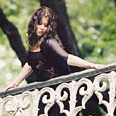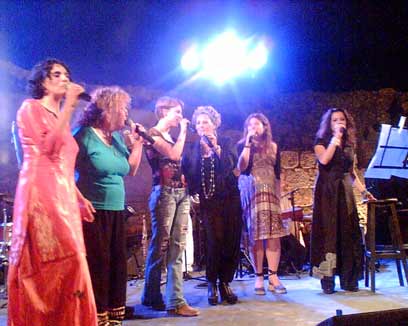
In a purple-plastered basement studio the harmonious cacophony of concert preparations crowded the air as we waited for Neshama Carlibach, daughter of the legendary spiritual singer Shlomo Carlibach and an artist in her own right, to emerge from rehearsals.
Musicians flowed in and out of the cramped space, each one preparing for an upcoming slate of concerts the 7.5-month pregnant Neshama would be giving in Israel, the most immediate of which was a festival of Israeli singers singing Carlibach in a groundbreaking concert connecting the spiritually-charged music of Carlibach with secular Israeli singers.
Beyond bridging the religious/secular divide, recent project also broke a seemingly superficial gender divide prevalent in Carlibach. The concert's organizer, Jonty Zwebner, when asked how the idea for the event arose, explained:
"Until now, there has been a trend that only men sing Carlibach, except Neshama. And she sings it so nicely, it really has an effect on the audience that we had the idea of women singing Carlibach, and not necessarily those that identify with the movement, but just those who connect to the music."

Women singing Carlibach
According to him, a disc of 36 songs was sent to a range of female Israeli artists throughout the country. Each chose the song they would perform at the festival.
Neshama agreed to squeeze an interview with Ynetnews into her hectic rehearsal schedule, already burdened by a sleepless, jetlagged 48-hours.
Are you scared being here?
"I’m not actually. I am more scared for my baby. If I weren’t pregnant I don’t think I would have hesitated. During the intifada I was here like five or six times, during the worst of it, when it was happening randomly. But I didn’t ever think that I wouldn’t come, but now with the baby it's different.
"I never thought that something would be as important to me as this, that something could take that place. You love something so much and then you discover that you have even more love. I love my husband, my father, my family so much. I mean, I didn’t think I could possibly have room for more love. But it's like an elastic, like the Beit Hamikdash that kept expanding to fit all the people. It was like where are all of these people coming from, how are they all fitting here?
"This trip was planned way in advance, before everything changed in the world. And I was really excited that my last trip out of New York with my baby is to Israel. I’m not actually getting on a plane until December, and please G-d I’m coming back here in February with the baby. I was excited. It was going to be the first time I take the baby somewhere and to the last place I went when I was pregnant.
"It felt very symbolic. And then everything happened. I'm very proud of David (producer) for coming. David is really the other half of my playing. His arrangements, his playing are really completely brilliant. How few people have a professional relationship with someone for eleven years. He’s like my brother. We’re best friends. We’re very blessed."
What about playing for all-women audiences?
"I think there are women who don’t want to be in the room with men. They feel more free when the men are not there. And if they feel more free coming on the night when there will be no men, then that’s the night they should come. But I sing for mixed audiences. Some 99 percent of my shows are for mixed audiences."
And that’s comfortable for you?
"Yeah, 100 percent. My father never told me not to sing for men. I’ll tell you exactly what he said. He said that if we lived in a time when every Jewish woman was lighting Shabbat candles and every Jewish woman felt that she had a voice to talk to G-d then women wouldn’t have to sing.
"But as long as there is even one woman in the world who feels disconnected and far from G-d, she thinks that she is limited and she thinks that she doesn’t have the same rights, the same opportunities, then, he said, my daughter has to sing. And he said this to me even before I thought this would be my career. I didn’t think what I was doing was so important, but then after my father died it became a part of my heart."
How does it feel being a conduit for other people?
"It feels very privileged. In this business it is very hard. Because of Kol Isha there is always someone telling me that what I am doing with my life is wrong. And as strong as you want to be and say that this is what I’m doing and it’s none of their business it’s still very challenging."
You’ve been singing Jewish music for years. But recently there has been a whole new hype around Jewish music, like with Matisyahu. Is it a trend? How do you feel about this?
"I hope so. I feel like the world is recognizing Judaism more, the US government is recognizing Judaism more, and Israel more. We spent how many thousands of years not being recognized by the rest of the world and suddenly people on the outside are recognizing all these beautiful aspects of what we are. I couldn’t be happier. I don’t think they’ve gone far enough. But we definitely are getting more acknowledgment and more opportunity as Jews."
Would you draw a line, set a limit to this trend?
"No. My dad would sing for nuns and priests. He would have them all singing Am Yisrael Chai. It doesn’t matter it touches everybody."
What is your favorite song?
"I really like Veshamru. I also like David Melech because I was there when my dad wrote it and I witnessed that whole process. When people sing it, they just go on for like three hours. It really does something for me. I like all of them really, but those two in particular."
And from your own songs?
"Each one is really an accomplishment. My sixth disc is coming out in December and it's all original music. Each one of them is a part of my heart so how could I say I like one more than the other."
Neshama performed in Beit Guvrin last Wednesday, August 9, and Monday, August 14th in Jerusalem. She is expected back in Israel in February 2007 for more concerts.















